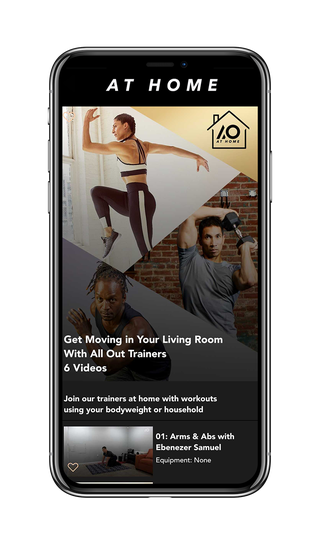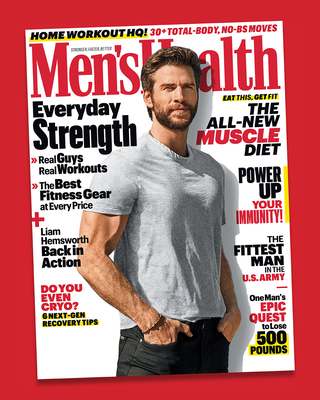5 Essential Training Tips for Your Living Room Workouts
Let’s be honest: The past few weeks of quarantine and self-isolation have been tough, especially if you had a dedicated fitness routine. The gym is a fun place to be, after all—it’s a spot that gives you a chance to feed off the energy of others, get a shot of inspiration, and socialize (between sets, of course). We miss it, very much.
But with the response to the pandemic meaning that most facilities are shut down, you have to realize that your gym for the time being is where you lay your towel—be it in your garage, backyard, or living room (after you’ve pushed the couch out of the way, of course).
That concept may take some getting used to, but think of the advantages: No more waiting for equipment, no gym dues, and, maybe best of all, you’re the only one who can control the music! To help you make the most of your new digs, we’ve created a free At Home fitness series, available on our streaming video fitness platform, All Out Studio.

Men’s Health
WORK OUT HERE
We challenged some of the best trainers in the world to create the ultimate living room-friendly workouts, so that you can train your whole body with only your own weight and common household items, such as a towel or chair. The At Home series offers of different workouts and styles each lasting only 15 minutes, so that you can come out of quarantine leaner and stronger than you were before.
To help you get started, we collected the following tips from the At Home trainers to help you maximize your results from wherever you’re working out. Who knows? By the time the gyms open again, you may not feel like you need them anymore.
Trust the Workout
Gerren Liles, creator of Workout #3, Total Body HIIT
High-intensity interval training routines don’t work if you hold too much in the tank. To get an effective workout in only 15 minutes or so, you have to give each work interval your best effort. When doing a HIIT workout, “Go for max reps and rounds,” says Liles, “and trust that the workout you’re doing allows for enough recovery between rounds that you can power through the whole workout in the allotted time.” (Hint: Liles’ workout does.)
If you find that you can’t recover enough during your rest periods to keep your work periods intense, the program may be too advanced for you. Option B: rest a little longer at first, and work on shaving seconds off your rest periods over time.
Get Ready Every Day
Bobby Maximus, creator of Workout #5, Bootcamp
“Treat every workout like it’s your job,” says Maximus. “Don’t roll into your home gym or living room in your pajamas and expect to be able to get the most out of yourself. Shower, change into your workout gear, tie your shoes extra tight, and treat the workout like you were going to a gym to do it.”
While one of the perks of training at home is the informality and convenience of the whole thing, you’ll take your workouts more seriously with Maximus’ approach. “You’d be surprised how much showering and dressing beforehand can help with your mental clarity and focus,” says Maximus.
Use Your Head
Dan Giordano, DPT, CSCS, creator of Workout #7, Mobility
The mind-muscle connection is a term bodybuilders have long used to describe the ability of a lifter to connect to his muscles mentally. If you can focus your mind on what the muscles you’re training are doing, and how they perform, you can better activate them and achieve greater results. (It’s not bro science either: a 2016 review in Strength and Conditioning Journal showed it works.)
“Try to focus on the muscle you are targeting as you contract it,” says Giordano. “This will enhance the recruitment of the muscle fibers. The better you engage it, the more it will grow.” Mental focus is even more important when you’re limited to the use of light weights, as you may be training at home.
Dumbbell pressing a pair of 100s will build your pecs no matter what, but if you’ve only got access to 50s, you need to make them feel like 100 pounds to get a similar training effect. Performing your sets with full attention to how your muscles are lifting the weight can accomplish that. For example, on a dumbbell bench press, imagine how your pecs work to move your arms from your sides to in front of your chest as you lift the weight.
Perfect Your Form
Kara Liotta, creator of Workout #2, Abs
If you’re working out along with a video, don’t just dive in. Watch the whole workout first, and use the pause button to stop on each exercise that’s new to you. “This will give you a chance to get a better look at the form the instructor is using,” says Liotta. “You’ll see what proper alignment looks like, and you’ll have a better and safer workout.”
So curb your enthusiasm. Jumping right into a routine you’re unfamiliar with forces you to learn as you go, and it will disrupt your workout. By watching the whole routine first, you’ll know what to expect, and can even practice exercises that are new to you or particularly challenging first, so that when they come up in the workout, you’ll be ready to hit them hard, in real time, without second-guessing yourself and getting frustrated.
Keep Your Appointments
Sean Garner, creator of Workout #4, Total Body Strength
Yes, technically you might feel like you have all day to work out, but trust us: You’re better off if you act like you don’t. Just like any pre-quarantine gym session, having a routine will help you stay focused. “Plan it out, ask a friend to join in with you, or commit to a live streaming class,” says Garner. Schedule your workouts in a calendar so that you’re less inclined to say, “I’ll get to it later.”

Men’s Health
GET IT HERE
Ready to get to work? Get the entire At Home series free on the All Out Studio app.

Source: Read Full Article


